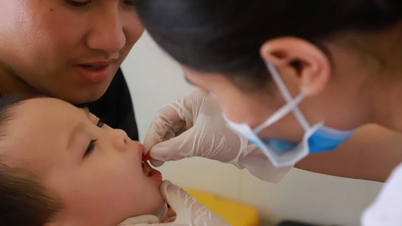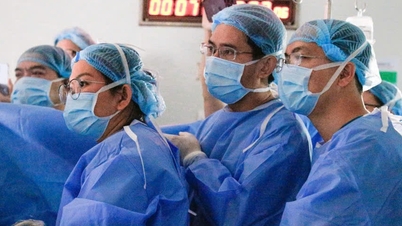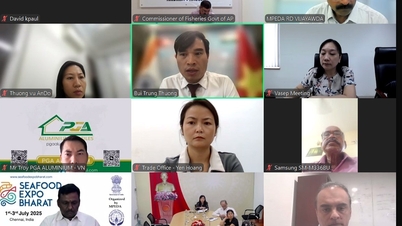According to WHO, UNICEF and Gavi, the Vaccine Alliance, global immunization efforts are currently threatened by a combination of factors including rapid population growth, protracted humanitarian crises and dwindling financial resources, directly affecting millions of children, adolescents and adults around the world .
WHO calls on countries and donors to continue financial commitments, strengthen accurate communication to counter vaccine misinformation, and strengthen vaccine surveillance and supply, especially in high-risk areas. |
Measles, which can be prevented with a vaccine, is making a comeback with increasing severity. The WHO said that the number of measles cases globally in 2023 is estimated to reach 10.3 million, up 20% from the previous year. This is mainly due to disruptions in vaccination programs during and after the Covid-19 pandemic.
In the past 12 months alone, 138 countries have reported measles cases, including 61 countries with major outbreaks. WHO predicts that this trend will continue through 2025 if no timely interventions are taken.
The situation is not limited to measles. In Africa, meningitis cases increased significantly in 2024 and have continued to rise rapidly this year. In the first three months of 2025, more than 5,500 suspected cases of meningitis and nearly 300 deaths were reported in 22 countries.
Yellow fever is also making a strong comeback. In Africa alone, 124 cases were reported in 12 countries in 2024. Meanwhile, the Americas have seen 131 cases in 4 countries since the beginning of the year.
In addition, diseases that were once effectively controlled or nearly eliminated, such as diphtheria, are also at risk of returning if the trend of declining vaccination continues.
WHO warns that nearly half of low- and lower-middle-income countries are facing disruptions in vaccination campaigns and vaccine supply shortages.
More than half of countries globally also reported severe disruptions in disease surveillance, including for vaccine-preventable diseases.
The number of children missing out on routine vaccines is also rising rapidly. In 2023, an estimated 14.5 million children worldwide will be missing out on all vaccines, up from 13.9 million in 2022. Notably, more than half of these children live in fragile states where health systems are often disrupted and health workers are in short supply.
To address this worrying situation, WHO, UNICEF and Gavi are calling on the international community to urgently increase investment in immunization programmes. In particular, it is essential to continue implementing the “Big Catch-Up” initiative, launched in 2023 to reach children who have missed out on vaccination during the pandemic.
International organizations emphasize that if we do not protect the achievements made over the past 50 years, especially in reducing child mortality through vaccination, the world will face many serious consequences, both medically and socio -economically.
WHO calls on countries and donors to continue financial commitments, strengthen accurate communication to counter vaccine misinformation, and strengthen vaccine surveillance and supply, especially in high-risk areas.
“Immunization is one of the most effective public health interventions ever devised. Let us not let complacency or underinvestment cost millions of lives, especially those of children,” WHO stressed.
In Vietnam, there are currently 11 infectious diseases including Tuberculosis, Diphtheria, Whooping cough, Tetanus, Measles, Polio, Hepatitis B, Hib pneumonia/meningitis, Japanese encephalitis B, rubella, Rota deployed in expanded immunization.
Over the past 40 years, hundreds of millions of doses of vaccines have been given free of charge to Vietnamese children and women. The results of expanded immunization have contributed significantly to the eradication of polio in 2000, the elimination of neonatal tetanus in 2005, and a significant reduction in the rate of dangerous infectious diseases.
According to Minister Dao Hong Lan, the Ministry of Health hopes that Vietnamese people will increasingly be vaccinated against dangerous infectious diseases.
In the coming time, the Ministry of Health will implement a plan to use new vaccines such as vaccines to prevent diarrhea caused by Rota virus, vaccines to prevent diseases caused by Pneumococcus, vaccines to prevent cervical cancer caused by HPV virus and consider reporting to the Government to add more vaccines to prevent other infectious diseases... to have more opportunities to prevent diseases for people.
The Minister of Health called on each medical staff to enhance their responsibility, fully implement the vaccination process, hospitals need to participate more actively in the implementation of the newborn dose of hepatitis B vaccine within the first 24 hours, coordinate timely handling of post-vaccination reactions, vaccination facilities need to strengthen good management of subjects, ensure people are fully vaccinated, on schedule, safely, improve the quality and effectiveness of disease prevention.
Media agencies, news agencies, and newspapers need to step up propaganda and mobilization work so that people understand the benefits and effectiveness of vaccines and the importance of full and timely vaccination, and actively take their children for vaccination.
The Ministry of Health has requested international organizations such as WHO, the United Nations Children's Fund, the Global Alliance for Vaccines and Immunization (GAVI), etc. to continue to accompany and support the expanded immunization program in Vietnam, a country with a large population and complex infectious disease epidemiology.
Source: https://baodautu.vn/canh-bao-bung-phat-cac-benh-von-co-the-phong-ngua-bang-vac-xin-d273321.html




![[Photo] Prime Minister Pham Minh Chinh attends the event "Digital transformation of the banking industry by 2025"](https://vphoto.vietnam.vn/thumb/1200x675/vietnam/resource/IMAGE/2025/5/29/0e34cc7261d74e26b7f87cadff763eae)


![[Photo] Prime Minister Pham Minh Chinh receives leaders of Excelerate Energy Group](https://vphoto.vietnam.vn/thumb/1200x675/vietnam/resource/IMAGE/2025/5/29/c1fbe073230443d0a5aae0bc264d07fe)























































































Comment (0)